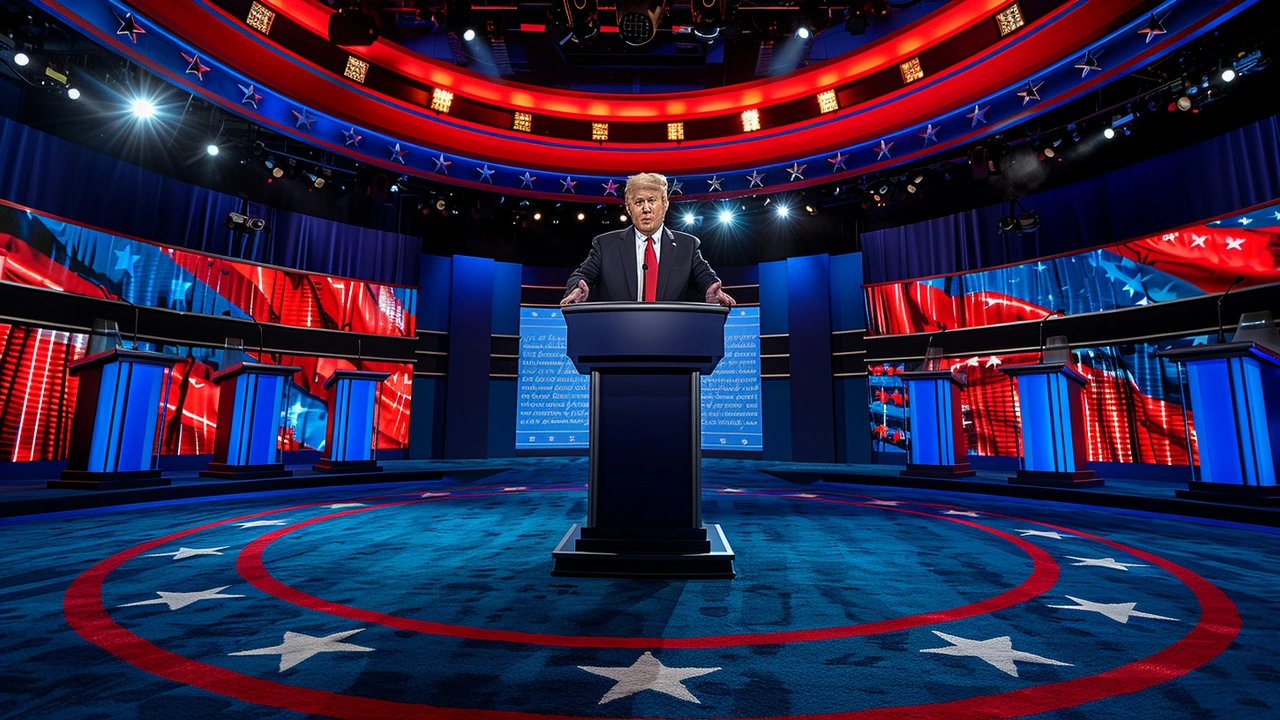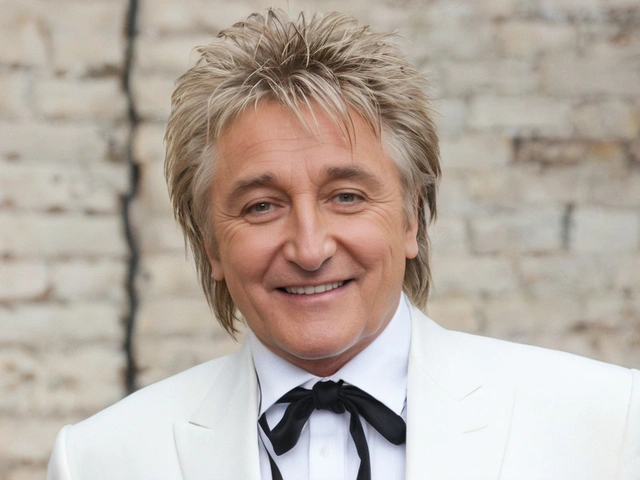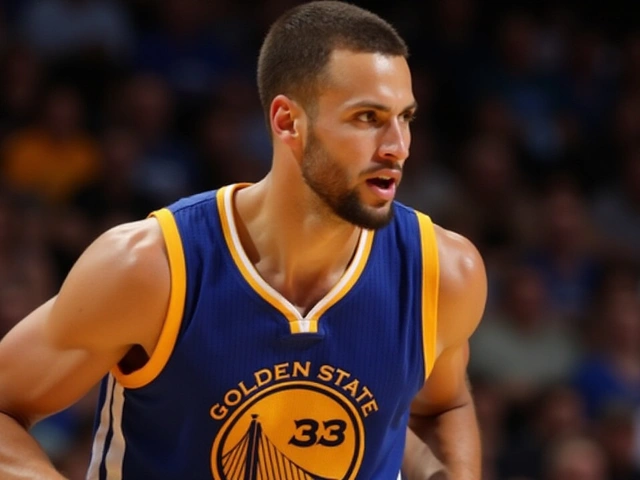Biden and Trump Clash in Contentious First 2024 Presidential Debate
The first US presidential debate of 2024 was anything but uneventful, unfolding on Thursday night with President Joe Biden and his Republican challenger Donald Trump facing off. The debate, hosted without a live audience and featuring automatic microphone cut-offs to prevent interruptions, delved into a number of hot-button issues including abortion, immigration, the conflicts in Ukraine and Gaza, and the state of the economy. The anticipation was palpable; after all, the outcomes of such debates often hold the potential to sway undecided voters. And in this case, it was broadcast to a nation deeply divided and eagerly watching two contrasting visions for America's future.
At 81, Biden entered the stage with a history of compelling public speeches, but on this occasion, his performance was uneven. The first half-hour, in particular, saw him stumbling over his words, leading some to question if his age was catching up with him. However, Biden soon found his footing, rallying as the debate wore on and taking a particularly aggressive stance against Trump. His most pointed attack came when he brought up Trump's conviction for covering up hush money payments to porn star Stormy Daniels. With a steely resolve, Biden labeled Trump as a 'felon,' a word loaded with implications that no doubt resonated with viewers.
Trump, always the showman at 78, responded with fire and fury, opting to deflect the criticism by highlighting the recent conviction of Biden's son, Hunter. Hunter Biden was convicted for lying about his drug use to purchase a gun, and Trump made sure to hammer this point home, aiming to paint the entire Biden family with a brush of corruption and deceit.
The debate was marked by several of Trump's false claims, which Biden diligently refuted. Among the more egregious, Trump falsely insisted that migrants were responsible for an uptick in crime and that Democrats supported infanticide—a charged and inflammatory accusation. Biden, maintaining his composure, countered these claims with facts and attempted to steer the conversation back to policy issues. This aspect of the debate highlighted a stark contrast between the two candidates: Trump's tactic of sowing fear versus Biden's effort to restore rational discourse.
The Abortion Debate: Diverging Philosophies
A significant portion of the debate focused on abortion, a topic that has divided the nation for decades. Biden took Trump to task for appointing conservative justices to the U.S. Supreme Court, which led to the elimination of a nationwide right to abortion. For many Democrats, and indeed many Americans who support reproductive rights, this move was a step back to a darker time. Biden argued passionately that such a fundamental right should not be left to individual states to decide, highlighting the patchwork of abortion laws across the country that has created significant barriers for women seeking these services.
Trump, portraying himself as a defender of states' rights, countered that returning the issue to the states was the most democratic course of action. He framed the Supreme Court's decision not as a regression, but as a win for federalism and local governance. This argument may resonate with his conservative base, but it also alienates a significant portion of the electorate who see the ruling as an infringement on personal freedoms.
Economy Under Scrutiny
The economy, always a central issue in any presidential debate, was another focal point. Biden pointed to recent economic gains, the creation of millions of jobs, and a drop in the unemployment rate as evidence of his administration's success. He attempted to highlight the stark contrast between his policies and those of the Trump administration, framing himself as a stabilizing force after what he described as the chaos of Trump's tenure.
Trump, however, dismissed these gains as superficial, arguing that the underlying economic indicators tell a less rosy story. He claimed that inflation was out of control and that ordinary Americans were struggling more than ever to make ends meet. According to Trump, Biden's economic policies were leading the country down a path of financial ruin, a narrative that finds considerable traction among voters who feel left behind by the current economic system.
Foreign Policy and National Security
Foreign policy and national security also featured prominently in the debate. Biden stressed the importance of maintaining strong alliances and recommitting to international diplomacy, pointing to his administration's efforts in navigating the wars in Ukraine and Gaza as examples of experienced leadership. He emphasized the need for a balanced approach, combining military strength with diplomatic avenues to secure peace and stability globally.
Trump, on the other hand, continued his America First rhetoric, arguing that too much focus on international issues detracts from domestic needs. He criticized Biden's handling of the Ukraine situation, suggesting that he had been too lenient and ineffective. On Gaza, Trump took a hardline stance, suggesting more aggressive military intervention. These positions, while controversial, play well with his base, which favors a more isolationist and nationalist approach to foreign policy.
Immigration Policy Divides
Immigration policy was another dividing line between the two candidates. Biden took the opportunity to highlight his administration's moves to reform immigration laws, ensuring kinder treatment for those seeking asylum and better pathways to citizenship. He decried Trump-era policies that he argued were inhumane and counterproductive.
Trump, meanwhile, doubled down on his tough stance on immigration, perpetuating the narrative that migrants are a threat to national security and economic stability. His rhetoric on this issue remains as polarizing as ever, but it continues to galvanize a significant portion of his support base who prioritize strong border controls.
Looking Ahead
The debate ended with both candidates standing their ground, each aiming to project strength and competence to a nation on the cusp of a crucial election. Opinion polls leading up to the debate had shown the race as virtually tied, and it remains to be seen how this first encounter will influence the electorate. The second and final debate is scheduled for September, giving both candidates another opportunity to sway voters before the November 5 election. With the stakes as high as they are and the nation watching closely, the race for the White House is set to be one of the most contentious and significant in recent memory.






Jensen Santillan
June 28, 2024 AT 13:07One cannot help but note the ostentatious display of rhetorical gymnastics from both candidates, yet the substantive policy discourse remains perilously thin. Biden's occasional verbal missteps betray the inevitable wear of a septuagenarian in the unforgiving glare of televised debate, whereas Trump persists in the art of hyperbole, cloaking partisan pandering in a veneer of populist bravado. The juxtaposition of their approaches underscores a broader epistemic crisis within the electorate, where factual veracity is increasingly eclipsed by performative conviction. Ultimately, the audience is left to navigate a cacophony of soundbites, each vying for dominance in the arena of public opinion.
Mike Laidman
July 2, 2024 AT 15:07The debate was undeniably a showcase of political posturing without the usual fanfare of a live audience. While the candidates each attempted to assert moral superiority the discourse frequently devolved into personal attacks. The moderators' use of automatic cut‑offs was a necessary measure to preserve a modicum of order. In sum the event offered limited insight into concrete policy trajectories.
J T
July 6, 2024 AT 17:07Trump’s claims were as wild as ever 😂
A Lina
July 10, 2024 AT 19:07The epistemic scaffolding employed by the incumbent appears to be constructed upon a foundation of incremental legislative metrics, juxtaposed against the challenger’s reliance on rhetorical hyperbole. From a policy‑analysis perspective, the discourse suffers from a paucity of granular data, thereby hampering evidentiary assessment. Moreover, the invocation of “felon” as a semantic weapon introduces a juridical nuance that warrants circumspect scrutiny. It is incumbent upon the electorate to parse these semiotic layers with methodological rigor.
Virginia Balseiro
July 14, 2024 AT 21:07Whoa, the drama in that room was electric! I could feel the tension rise with every punch line and rebuttal. It’s like watching a high‑stakes chess match where each move could change the entire board. Kudos to Biden for finding his stride after that rocky start – talk about a comeback! And Trump? Never a dull moment, that’s for sure.
Jared Mulconry
July 18, 2024 AT 23:07I think it’s important we acknowledge the genuine concerns on both sides without resorting to vilification. The debate highlighted stark ideological divides, yet there were moments of unexpected civility. Perhaps a more measured dialogue could pave the way for productive compromise.
Brandon Rosso
July 23, 2024 AT 01:07Indeed, the vigor displayed by the participants reflects the high stakes of this election cycle. Despite the theatrics, there are tangible policy implications that merit our close attention. It is heartening to observe moments where factual clarification pierced through partisan fog. May we continue to demand clarity and constructive discourse from our leaders.
Tracee Dunblazier
July 27, 2024 AT 03:07While I appreciate the optimism, the reality remains that many voters feel unheard. The echo chambers persist, and we must strive for inclusive dialogue. Let us hope future exchanges bridge rather than widen those gaps.
Edward Garza
July 31, 2024 AT 05:07The moderator’s reliance on automatic cut‑offs, while ostensibly neutral, inadvertently amplifies the louder voice. This structural bias skews the perception of debate performance. Moreover, the selective highlighting of certain claims over others suggests an editorial tilt. A more balanced approach would better serve informed citizenship.
Allen Rodi
August 4, 2024 AT 07:07Great points raised about the moderation tools. For those interested, a quick tip: reviewing the transcript can reveal nuances lost in the broadcast. It’s also useful to cross‑reference claim‑checking sites to separate fact from fiction.
Jody Webster
August 8, 2024 AT 09:07i cant b'leeve how many typos were in the script,, the flubbed pronunciations are laughable,, it's like an amateur theater, not even close to presidential standards. the whole thing felt rushed,, and the lighting was terrible, like a bad cheap production. sure, it was a debate,, but c’: it could've been better.
Steve Goodger
August 12, 2024 AT 11:07Reflecting on the broader implications of this first debate, it becomes evident that the theatricality observed is not merely a product of individual personalities but also an artifact of an increasingly polarized media ecosystem. When viewers are conditioned to consume soundbites rather than substantive analysis, candidates are incentivized to prioritize the spectacle over policy depth. This dynamic is reinforced by the relentless 24‑hour news cycle, which rewards moments that generate clicks and viral moments, often at the expense of nuanced discussion. Moreover, the structural design of the debate – with its enforced mute periods and rapid fire exchanges – leaves little room for thoughtful exposition, compelling participants to resort to rehearsed talking points. It is also worth noting that the audience, though absent, is nevertheless present in the form of millions of livestream viewers whose attention spans are notoriously fragmented. Consequently, candidates must balance the need to appear decisive with the risk of alienating viewers who seek clarity on concrete proposals. The resulting discourse, therefore, oscillates between grandiose promises and defensive rebuttals, rarely descending into the granular policy analysis that the electorate deserves. In the context of immigration, for instance, the candidates glossed over the complexities of legal pathways, instead opting for broad characterizations that serve partisan narratives. Similarly, on the issue of abortion, the conversation remained confined to abstract principles rather than addressing the practical ramifications of state‑level legislation. The foreign policy segment also suffered from a reductionist approach, with each side presenting binary choices that overlook the intricate web of diplomatic relations and strategic interests. As we look ahead to future debates, it is imperative that both the format and the participants evolve to accommodate deeper, evidence‑based dialogue. This could involve extending response times, integrating fact‑checking mechanisms in real time, and encouraging moderators to probe beyond surface‑level claims. Ultimately, a more informed citizenry depends on the ability of our democratic institutions to foster substantive, rather than sensational, exchange.
johnson ndiritu
August 16, 2024 AT 13:07Wow, that deep dive was something else! 🌟🌟